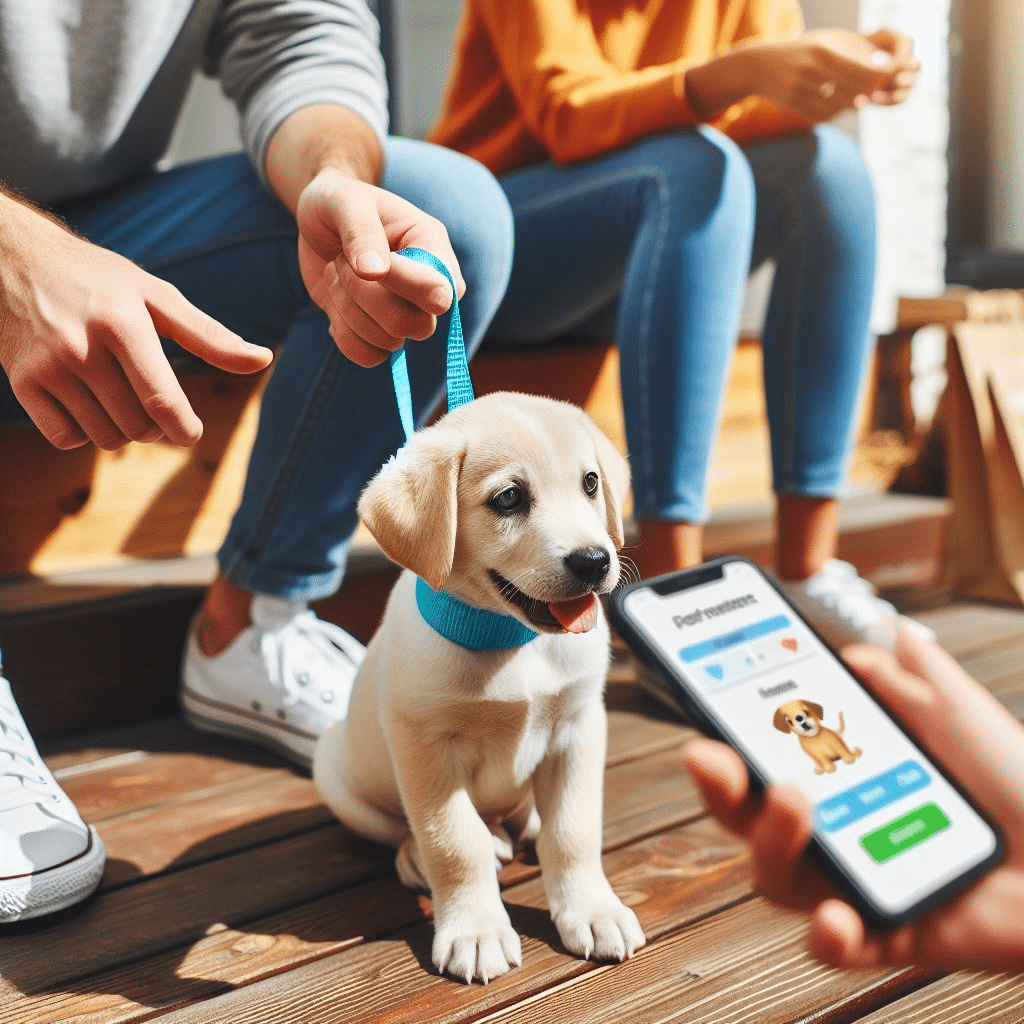Puppies are delightful additions to our lives, full of energy and a zest for exploration. However, all that enthusiasm needs channeling to ensure they develop into well-adjusted mature dogs. This is where puppy training plays a vital role. Puppy training apps offer a convenient and accessible way to establish a strong foundation of obedience, socialization, and positive behaviors.

Key Takeaways
- Puppy training is essential for safety, bonding, mental stimulation, and socialization.
- Technology has revolutionized how we approach puppy training, offering accessibility and affordability.
- Puppy training apps bring structure, variety, and progress tracking to your training routine.
Puppy training apps
Importance of Puppy Training
Puppy training goes far beyond teaching your dog how to sit and stay. Here’s why it’s so crucial:
- Behavior and Safety: Training helps manage unwanted behaviors like jumping, barking, and destructive chewing. It teaches your pup essential commands for safety, ensuring they respond to you even in distracting environments.
- Bonding: Training sessions are an excellent way to build a deep bond based on trust and communication.
- Mental Stimulation: Learning new skills challenges your puppy mentally, preventing boredom and potential problem behaviors.
- Socialization: Puppy training often includes controlled socialization opportunities, teaching your dog to interact appropriately with other animals and people.
Role of Technology in Modern Dog Training
Technology has undeniably transformed many aspects of our lives, and dog training is no exception. Puppy training apps put a wealth of resources directly in the hands of dog owners. Here’s how technology is reshaping the way we train our furry companions:
- Accessibility: Apps eliminate the need always to find and schedule sessions with dog trainers. You can access professional guidance and training modules on demand, fitting training into your schedule.
- Affordability: Puppy training apps are often more cost-effective than hiring a private trainer for numerous sessions.
- Customization: Many apps allow you to tailor training plans to your puppy’s specific breed, age, and learning style.
- Visual Learning: Apps frequently use videos and demonstrations, providing clear examples of how to teach your dog new commands and behaviors.
- Community Support: Some apps have built-in communities where you can connect with fellow dog owners, ask questions, and share your training journeys.
Why Use Puppy Training Apps?
Puppy training apps offer a suite of advantages, making them a fantastic resource for modern dog owners. Here’s a breakdown of the key benefits:
- Convenience: Train whenever and wherever suits you. With an app, you don’t need to coordinate schedules with a trainer or travel to specific locations. Short, focused training sessions can easily fit into your daily routine.
- Variety of Training Modules: Apps often offer a wide range of training lessons covering basic obedience, advanced skills, tricks, and addressing behavioral issues. This vast library of content allows you to progress at your own pace and cater to your puppy’s needs.
- Progress Tracking: Many apps include tools to track your puppy’s progress. This helps you visualize their development, identify improvement areas, and celebrate their successes.
How to Choose the Right Puppy Training App
With so many puppy training apps, finding the perfect fit can feel overwhelming. Here are some essential factors to consider:
- User Reviews and Ratings: Check app store reviews and ratings. Look for patterns in feedback to get insights into the app’s usability, effectiveness, and how well it addresses common puppy training challenges.
- Training Methodologies: Ensure the app’s training approaches align with your values. Positive reinforcement methods centered on rewards and encouragement are proven highly effective and foster a positive learning environment for your pup.
- Customizability: A good app should offer some degree of personalization. Look for features that let you tailor training plans to your puppy’s specific needs and your learning preferences.

Integrating Apps into Your Training Routine
Puppy training apps are powerful tools but work better when used strategically. Here’s how to seamlessly weave them into your puppy’s training journey:
- Setting a Schedule: Consistency is vital when it comes to puppy training. Dedicate even short bursts of time (5-10 minutes) to app-based training sessions several times a day. Integrate these into your puppy’s routine.
- Balancing Technology and Personal Interaction: While apps are fantastic resources, they shouldn’t replace real-world interaction. Combine app-based lessons with plenty of hands-on practice, play, and socialization.
- Monitoring Progress: Use your app’s progress-tracking features and your observations. This awareness lets you adjust your training plan as needed, ensuring you’re constantly addressing your puppy’s needs.
Challenges and Solutions
Like any training method, app-based training comes with its potential challenges. Let’s look at some common issues and solutions:
- Common Issues with App-Based Training
- Distractions: It can be more challenging for your puppy to focus at home compared to a controlled training environment.
- Lack of Personalization: Apps may not fully account for your puppy’s unique personality and quirks.
- Misinterpreting Cues: Videos can be helpful, but it’s possible to misinterpret dog body language or training techniques without an expert.
- Overcoming Obstacles
- Minimize distractions: Choose a quiet area for training sessions.
- Supplement with Real-World Practice: Take the skills your puppy learns in the app and practice them in different settings and with increasing levels of distraction.
- Consider Professional Consultations: If you encounter significant setbacks, consider supplementing app-based training with a few sessions with a professional trainer. These experts can provide tailored advice and pinpoint specific issues.
Expert Opinions
Dog trainers and behaviorists offer unique perspectives on puppy training apps. Here’s what they have to say:
- Quotes from Dog Trainers
- “Puppy training apps can be an excellent starting point for new dog owners. They provide structure and guidance, especially for those without access to a trainer.” – Sarah Wilson, Certified Professional Dog Trainer (CPDT-KA)
- “While apps shouldn’t replace the hands-on experience of working with a trainer, they are a valuable supplement to reinforce techniques and track progress.” – Mark Adams, Canine Behavior Consultant.
- Recommendations
- Positive Reinforcement: Experts universally emphasize the importance of choosing apps that promote positive reinforcement methods. These methods build trust and a stronger bond with your puppy.
- Socialization is Essential: Trainers often stress that apps should not be the sole training source. Regular, controlled socialization with other dogs and people is crucial for a well-rounded dog.

Future of Puppy Training Apps
The world of puppy training apps is constantly evolving, and we can anticipate some significant advancements in the years to come:
- Trends
- Artificial Intelligence (AI): AI-powered apps could analyze videos of you and your puppy, providing personalized feedback and tailored training plans.
- Gamification: Training modules may incorporate elements of games and rewards, making the learning process even more engaging for both dog and owner.
- Augmented Reality (AR): AR features could overlay training instructions onto the real world, offering an immersive and interactive training experience.
- Potential Developments
- Virtual Consultations: Apps might integrate options for live, virtual consultations with certified trainers, bridging the gap between app-based and in-person training.
- Wearable Technology: Smart collars and harnesses that track activity, vitals, and behavior could pair with apps for a more holistic picture of your puppy’s well-being and training needs.
- Breed-Specific Focus: More apps may emerge with specialized content for unique breeds, addressing their distinct predispositions and training styles.
Top 10 Trending Puppy Training Apps:
1. Puppr
- Features: Step-by-step video lessons by Sara Carson covering basic obedience to advanced tricks. Built-in clicker for effortless training. Community features to share progress.
- Pros: Excellent instructional quality, great for trick-focused training, the built-in clicker is convenient and suitable for dogs of all ages.
- Cons: It may be overwhelming for brand-new dog owners and a bit pricier than other options.
2. GoodPup
- Features: 1-on-1 private video sessions with certified trainers. Personalized training plans. Unlimited messaging with trainers for extra support.
- Pros: The top option for tackling specific behavioral issues and getting hands-on help. Trainers can tailor plans to your dog’s needs.
- Cons: Cost is the most significant barrier for many. Some trainers may need more availability, causing scheduling delays.
3. Dogo
- Features: Personalized training programs, in-app clickers, dog whistle, community features, and fun challenges to earn badges.
- Pros: Excellent balance of structured training and playful learning. The community aspect provides motivation and support.
- Cons: Some features can feel a bit gimmicky, and the sheer volume of options might overwhelm some users.
4. Pupford
- Features: 30-day puppy training course led by Zak George and additional courses for older dogs. Well-structured video lessons cover basics, behavior, and tricks.
- Pros: Simple to follow for beginners, an excellent foundation for puppies and older dogs learning new skills. Zak George’s teaching style is engaging and positive.
- Cons: Less customized to individual dogs versus something like GoodPup. It feels less comprehensive than some competitors with more extensive lesson libraries.
5. trainer Dog Whistle & Clicker
- Features: Focus on sound-based training, with multiple clicker sound options and customizable frequency dog whistles: built-in training instructions and tips.
- Pros: Great for those favoring clicker/whistle training methods. A simple interface and features make it convenient to use.
- Cons: Limited if you’re looking for a comprehensive training program – focused more on the sound tools than complete lesson plans.
6. Doggy Time
- Features: Training plans, progress tracking, reminders for training/grooming/vet visits, and a dog-focused social network to connect with other owners.
- Pros: Great ‘all-in-one’ management app for dog owners. It keeps you organized with training as well as other dog-related tasks.
- Cons: Training plans are less in-depth than apps like Puppr or Dogo. It is better as a supplement to other training resources.
7. EveryDoggy
- Features: Game-based learning makes training sessions fun and engaging. Covers basic commands and behavioral concepts.
- Pros: Excellent for dog owners who want to add playfulness to training and for easily distracted dogs. The game format can be motivating for those who struggle with traditional methods.
- Cons: Not as structured as some other apps, making progress tracking harder. There may be better fits for owners needing more detailed guidance.
8. GoDog
- Features: Training routines and workout plans designed for you and your dog. Includes tracking for activities and training progress.
- Pros: A great way to combine fitness with obedience training. Perfect for active owners with dogs that need both mental and physical stimulation.
- Cons: Some training programs can be simplistic. It might not replace a dedicated training app if advanced lessons are your primary focus.
9. Woofz
- Features: Quick, focused training sessions designed with short attention spans in mind. Precise progress tracker, gamified elements like leveling up.
- Pros: Excellent for limited-time owners who want to fit in practical, consistent training. Lessons are simple to follow and manage.
- Cons: Lacks the community features of some other apps, making it feel a bit isolating. It may need to address complex behavioral problems more effectively.
10. Pocket Puppy
- Features: Specifically designed for young puppy training. Targets common puppy challenges like potty training, crate training, socialization, and basic commands.
- Pros: Provides a structured, age-appropriate approach to puppy raising. Great for first-time puppy owners needing guidance with those crucial early months.
- Cons: It focuses on a narrow puppy window that is unsuitable for training older dogs. It may not be as customizable as other apps for specific behavioral issues.
Conclusion
Puppy training apps have become game-changers for modern dog owners. They offer convenience, expert guidance, and adaptable training programs to help you raise a happy, well-behaved companion. While they should only partially replace in-person training or socialization, puppy training apps provide a valuable toolbox to enhance your dog’s development journey.
If you’re a new puppy owner or looking to advance your dog’s training, exploring the world of puppy training apps is a worthwhile step. Do your research, consider expert recommendations, and discover an app that aligns with your and your furry friend’s needs. Embracing these technological tools could create a more fulfilling and joyful experience for you and your beloved pup.

